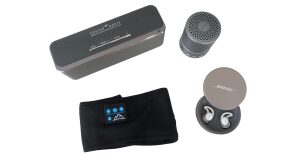In a recent conversation between Tamara, a long-time tinnitus sufferer, and Treble Health founder Ben Thompson, AuD, the two spoke about the journey of tinnitus management. Their discussion was insightful, personal, and, at times, even humorous. But the topic of tinnitus management is a serious one. Here are some takeaways that may help the more than one in ten tinnitus sufferers in the U.S. know when and where to seek help.
Tamara’s story began one spring morning when she awoke with intense ringing in her ears – high pitched and extremely loud. Because the pain was so sudden, she decided to reach out to her physician for fear of a more concerning issue at the root of her symptoms.
After being told her complaints were consistent with tinnitus, the doctor informed her there wasn’t much that could be done to mitigate or manage her pain. “It’ll just go away with time.”
What Tamara was experiencing, however, wasn’t just some low-level hum. She describes it as at least a nine on a ten-point scale. Indeed, it was extreme enough to impede sleep and routine daily activities, including maintaining relationships and job performance.
More importantly, her clinician’s advice was just plain wrong. What Tamara didn’t fully understand at the time is that there are strategies to dull the pain.
Shortly after Tamara’s diagnosis, she discovered Treble Health. That connection moved her from a doctor saying, “There’s no pill we can give you [or] surgery that will help you,” to the benefit of a care team equipped with a suite of management options.
Tamara talks about the early stages of her management as a journey. First, with cognitive behavioral style support and sound therapy, which quickly brought her discomfort from a ten on the pain scale to a four or five.
“Then it really is about trying to focus. You have to focus your thoughts. You have to get past the noise. And sometimes that noise can feel physical. Like you feel like your ears hurt. You have to focus on something else. You have to calm yourself down. For me, I did a lot of writing.”
She goes on, “There will be bad days, but there will also be good days. Often, I leave the house and take a walk. On days where it’s really bad, I just put my shoes on and I get outside. I take some deep breaths, get some fresh air, maybe put a podcast in, something else to focus my ears on. Also, having a support system… family… amazing friends… people around me.”
Among the great hacks she mentions is buying a notebook to track the trek. “On a scale of one to ten, write down where you’re at throughout your journey. As you move through the process, you’ll look back at two months ago to see what it was.” Having that history puts things into perspective. “Your tinnitus will change. It will get quieter, it will get less intense, it will get less intrusive and your life can go back to normal.”
This is what’s referred to in the tinnitus field as habituation – when your brain naturally reduces tinnitus over time by getting accustomed to the sounds and treating them as non-threatening, background noise (similarly to how the brain normalizes the sounds of chewing or breathing).
Lastly, Tamara encourages people who struggle with tinnitus to move beyond the earbuds and try more formal treatments – both sound therapy and actual cognitive behavioral therapy from a licensed professional. “When I was paired with an audiologist [through Treble], I was a mess every time we talked. She taught me how to get my mind to focus on other things than the noise. But more than that, she introduced me to maskers.”
The tinnitus maskers, it turns out, were a lifesaver. “One of the problems that I was having was that using regular earbuds hurt my ears. For the amount of time that I had to listen to sound therapy for it to be effective just wasn’t working for me. Instead, I popped maskers on in the morning. I’d leave them in for six, eight hours. That’s been a complete game changer.”
Tamara’s tinnitus still changes day to day. “I wish it was one of those things where it was just one sound and it was just that simple, but I hear three different sounds most of the time.” From being in a room of cicadas to whooshing and high-pitched rings, the noises haven’t altogether gone away.
But much of the stress has – because the strategies to address those stresses are exercised and reinforced every day.
She notes, “It’s hard because when you’re in it, you just feel so defeated. You feel like the work you’re putting in [it’s succeeding] because the process is so slow. But I think you just have to be steadfast because at the end of the day, what is the alternative? The alternative is your tinnitus is not going to go away. It’s not going to get better. You’re going to take a much longer time to habituate. So just stick with it and you’ll get there.”
Tamara isn’t alone in her experience – and in the efficacy of her treatment plan. Therapy, maskers, and just knowing you have a community of health partners to support you along the way are all invaluable to taming your tinnitus.
Do you have a story to share? We’d love to hear it! And if you’d like to answer a few questions to see how Treble may be able to aid in your relief, take the tinnitus survey here.
Next Step: Book Free Consultation
- 75% of patients reduced their tinnitus within three months after following our recommendations.
- "I feel like Treble Health literally gave me my life back." - Randy S. (verified customer)
- Join thousands of people who have reduced their tinnitus after scheduling a free consultation.











